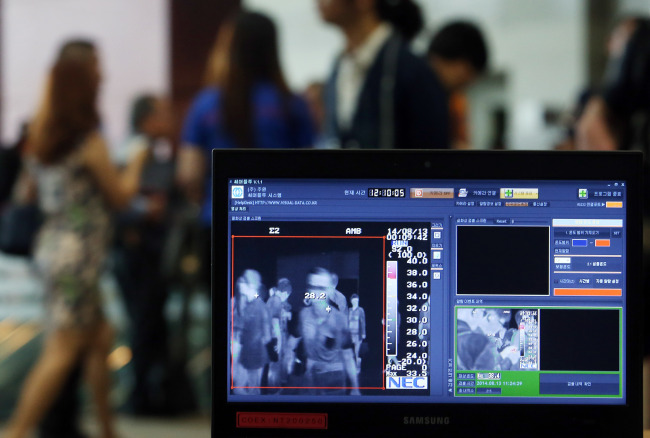<관련 영문 뉴스>
Envoy assails Korean ‘Ebola panic’
Foreign envoys posted here representing countries in Africa are pushing back at what they describe as an irrational “Ebola panic,” amid fears among the South Korean public of the spread of the deadly disease that is currently affecting parts of West Africa.
Earlier this month, Duksung Women’s University rescinded an invitation for three young women from Nigeria to attend the World Congress of Global Partnership for Young Women 2014, which took place from Aug. 4-15.
Duksung Women’s University in Seoul said the school “politely withdrew” its invitation for three Nigerian students to attend an international conference that it is cohosting with the United Nations.
At around the same time, a group of South Korean medical volunteers called off a trip to West Africa.
Then, on Aug. 14, Korean Air announced it would suspend direct flights to Jomo Kenyatta International Airport in Nairobi, the capital city of the East African nation of Kenya, even though it is not among the four West African countries affected by Ebola ― Liberia, Sierra Leone, Guinea and Nigeria.
KAL’s fears presumably stem from the fact Jomo International is a major air transit hub and serves those nations.
But the World Health Organization on Aug. 15 announced in a statement that there is little chance of international air travel acting as a conduit for spreading the Ebola virus around the globe, repeatedly emphasizing that such a risk was “low.”
“The risk of transmission of the Ebola virus disease during air travel is low. Unlike … influenza or tuberculosis, Ebola is not spread by breathing air (and airborne particles it contains) from an infected person,” according to a recent statement by the WHO on Aug. 18.
The WHO also urged airlines around the world to not cancel flights to countries affected by the outbreak in West Africa.
Kenya’s top diplomat here attempted to persuade the government and Korean Air that canceling flights to East Africa is not a rational response to the fear of the spread of the Ebola virus affecting parts of West Africa.
On Wednesday, Kenyan Ambassador to South Korea Ngovi Kitau said he met with Lee Sang-beom, vice president of Global Sales at Korean Air, to persuade him to rescind the company’s decision to cancel direct flights to East Africa. That cancelation remains in place.
The Ebola panic was even manifested in a popular entertainment district in Seoul over the weekend of Aug. 16, causing a storm of controversy on social media sites.
Owners of JR Pub in Itaewon, once popular with both locals and expatriates residing in Seoul, posted signs on the front window of their establishment that read, “We apologize but due to Ebola virus we are not accepting Africans at the moment.”
Banning all Africans from the pub would include over 1 billion people ― including the several thousand who reside in South Korea ― even though there has not been a single reported case of the deadly disease here.
Though the signs were quickly taken down and the owners apologized ― after backlash on social media primarily by non-Koreans residing here ― the extreme case of panic pointed to the unfortunate consequences of a palpable fear among the South Korean public, according to foreign envoys posted here. Many of the envoys asked described it as “Ebola hysteria.”
“Stigmatizing an entire people for something that is happening in one small part of an entire continent is simply unfair. You cannot say that, if there is bird flu in Hong Kong, that you therefore punish all of Asia. It is simply not fair. In fact, it is really a medieval approach,” said South African Ambassador to South Korea Hilton Dennis on Tuesday during a reception celebrating the 54th National Day of a Gabon, a country on the west coast of central Africa.
“I think Korean companies must conduct with their publics to find rational solutions.”
British Ambassador Scott Wightman and Indian Ambassador Vishnu Prakash, two foreign diplomats posted here, spoke out about the unfairly prejudicial signs via their Twitter accounts.
In another incident exemplifying irrational fear of the spread from Africans here of the Ebola virus, the Ivorian ambassador described an incident that took place on the National Day of Cote d’Ivoire at a hotel in Seoul on Aug. 8.
Ivorian Ambassador to South Korea Sylvestre Bile said some servers at the event were “not happy with serving food brought from the residence because of Ebola,” adding that he did not submit a formal complaint to the government because “What can the government do? The panic is too widespread.
“It’s a panic. It is very unfortunate that people here are panicking about this. If something happens in one part of Africa, then that means everyone in Africa is infected. It is not true,” Bile said.
Korean Air’s last flight on the route was Wednesday. That flight carried six Kenyan officials in Seoul for a conference on South Korea’s “Saemaul Undong” movement, a 1970s rural development initiative promoted by Seoul in many African nations.
The carrier was flying three flights a week between Seoul and Nairobi. It is the only direct flight to Africa by an airline based in East Asia. On Thursday, Kitau said he even met with Kwon Hee-seog, director-general of the Bureau for African and Middle East Affairs at the Foreign Ministry, to solicit the government’s help to tamp down the panic.
By Philip Iglauer (
ephilip2014@heraldcorp.com)




![[Herald Interview] 'Trump will use tariffs as first line of defense for American manufacturing'](http://res.heraldm.com/phpwas/restmb_idxmake.php?idx=644&simg=/content/image/2024/11/26/20241126050017_0.jpg)

![[Health and care] Getting cancer young: Why cancer isn’t just an older person’s battle](http://res.heraldm.com/phpwas/restmb_idxmake.php?idx=644&simg=/content/image/2024/11/26/20241126050043_0.jpg)

